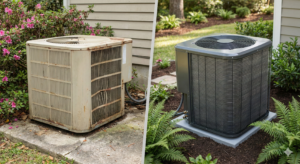It’s no secret that summer heat in Charleston can crank up fast, and when your air conditioner isn’t doing its job, things get uncomfortable quickly. While most people think about filters, refrigerant, or thermostat problems when something goes wrong, there’s another part of the system that often gets overlooked: the sensors. These small components play a big role in how well your AC runs every day.
When AC sensors work like they should, your system knows when to turn on, how long to run, and when to shut off. If there’s something going wrong with one of those sensors, your system can start acting up, like turning on and off too often or not cooling enough. Taking the time to understand how your AC sensors work and what goes wrong with them can keep your system from slipping up when you need it most.
What Are AC Sensors?
Think of AC sensors as the eyes and ears of your air conditioner. They pick up on what’s happening in and around the system so it can adjust to the right settings and deliver balanced comfort in your home. Every time your AC kicks on or starts a cooling cycle, it relies on different sensors to measure things like temperature, humidity, and pressure. When those sensors send accurate information, your system runs smoothly. But if they send the wrong signals, everything can get thrown off.
Here are a few types of sensors you’ll typically find in a home AC setup:
1. Temperature Sensors: These are responsible for reading the temperature inside your home. They tell the AC when to start or stop cooling.
2. Humidity Sensors: These measure the moisture levels in the air. Some AC systems adjust how they run based on humidity to make the indoor air feel more comfortable.
3. Pressure Sensors: Found inside the system, these keep an eye on refrigerant pressure to help everything operate safely and efficiently.
4. Thermistor Sensors: These are located near the evaporator coils and regulate how cold the air gets before moving through your home.
Each sensor has a job to do. If just one starts misreading information, your AC system might make the wrong adjustments like cooling the air too much or not enough. Over time, this can lead to stress on internal parts and bigger, more expensive breakdowns.
Common Problems With AC Sensors
Most AC sensor issues don’t happen all of a sudden. They tend to build up quietly over time. A lot of the time, something simple like a sensor slipping out of place or getting dirty can lead to major comfort problems inside the home.
Here are some of the common problems we see with AC sensors:
1. Loose or misaligned sensors that can’t read the environment accurately
2. Buildup of dust or debris interfering with sensor function
3. Damaged or corroded wiring sending false signals
4. Sensors wearing out with age and normal use
One of the most frustrating symptoms of a sensor problem is short cycling, where your AC turns on and off too frequently. It uses more energy and never finishes a full cooling cycle. In other cases, a faulty sensor might keep the unit running too long or not long enough, which makes your home feel uncomfortable and unevenly cooled.
Let’s say a temperature sensor picks up heat from another appliance or a sunny window. The AC might mistakenly think the whole house is too warm and overcool the space. On the other side, if a thermistor is worn out and sending incorrect signals that it’s already cool enough, your unit might shut down early and leave you sweating. These small problems can easily spiral if ignored.
Signs Your AC Sensors Might Be Failing
Sensor problems can sneak up on you. They often start small but get worse over time. While you’re not expected to inspect each part of your system yourself, being aware of what to look for helps you take action before the problem grows.
Here are a few signs your AC sensors could be acting up:
– Your rooms feel too cold or too hot even though the system seems to be running
– The unit turns off and on multiple times an hour for no clear reason
– The AC never kicks on, even when the temperature inside rises noticeably
– Your energy bills are going up due to longer or more frequent cycles
One common issue we see is when homeowners set the thermostat, but inside the house it just doesn’t cool down like it used to. That’s often a result of poor sensor readings confusing the system. If your compressor or fans start working harder than they should, they’ll wear out sooner than expected.
Imagine it’s a bright, hot day in Charleston. You lower the thermostat expecting relief, only for the AC to start and stop in minutes. You sweat. The house doesn’t cool. What’s likely happened is that the thermistor near the coil is telling the system everything’s fine even though it’s not. These sensor issues disrupt comfort and load unnecessary strain on your system.
How Coastal Carolina Comfort Can Help
Dealing with failing sensors doesn’t have to mean sweating it out or guessing what went wrong. This is where an experienced AC contractor in Charleston really comes in handy. At Coastal Carolina Comfort, our trained technicians know exactly how to track down even the most hidden sensor issues and get your system running smoothly again.
If a sensor needs to be repositioned, recalibrated, or replaced, we’ll handle it quickly and thoroughly. We test every part to make sure it’s talking to the rest of the system correctly so you don’t end up facing the same problems again in a few weeks. Our team knows how Charleston’s weather affects HVAC systems and can help adjust settings and schedules to fit the unique needs of your home.
We’re familiar with every nook and cranny these sensors can hide in, so we don’t miss a thing. One visit from a skilled technician can help you avoid breakdowns during the peak cooling season.
Keeping Your AC in Top Shape
Avoiding sensor problems starts with some simple steps and a little professional care. Having your AC looked at once a year goes a long way. When our team visits for a check-up, we inspect everything from wires to filters to make sure the system is balanced and sensors are reading accurately.
Keep the unit and the space around it clean. Dust, leaves, and pollen can clog parts that need to breathe and operate freely. Over time, buildup can trigger sensor misreads. This is something that slips under the radar for many homeowners but creates big issues later.
Another good habit is to watch how your system behaves day to day. If rooms cool unevenly or turn chilly too fast, trust your instincts. These little problems can lead to bigger ones, especially once the heat kicks into high gear.
Sensors might be small, but their impact is huge. When they’re working properly, you enjoy quiet, steady comfort throughout the summer. If they’re not, your whole system suffers. At Coastal Carolina Comfort, we take care of sensor problems early so one faulty reading doesn’t turn into a long, hot summer.
If your home in Charleston is dealing with AC sensor troubles, professional support can keep your system running the way it should. A trusted AC contractor in Charleston can pinpoint sensor issues and get cooling performance back on track. Count on Coastal Carolina Comfort to handle the job right and keep your comfort going strong through the hottest months ahead.


